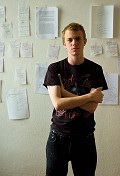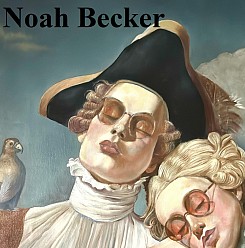Whitehot Magazine
February 2026
"The Best Art In The World"
"The Best Art In The World"
February 2026
July 2010, Keren Cytter @ Moderna Museet

Keren Cytter, Der Spiegel, 2007
Copyright Pilar Corrias Gallery
Keren Cytter
Moderna Museet
Skeppsholmen, Stockholm
8 May through 15 August, 2010
The Berlin-based Israeli Keren Cytter is probably the most important video artist working today. Her work fosters a sort of existential hysteria that has its parallels in reality television and other forms of recent mass media. Yet Cytter’s films are often hilarious and absurd while retaining some tragic, human force, like a great Russian novel. The current exhibition at Moderna Museet brings a selection of some of her strongest works to Sweden for the first time.
For Cytter, narrative is a game, and what gets produced is often more akin to meta- or anti-narrative, with a satirical nod to the conventions of both Hollywood and European art house cinemas. These recurring codings and motifs are perhaps best observed in a film like Something Happened, (2007) which is wisely positioned early on in the exhibition. The “story” can be reduced to three structural elements: a man, a woman, a gun. All the narrative possibilities that could occur in this situation are shifted through in the film’s 7 minute, 50 second span, the actors reciting their dialogue in a deadpan monotone that markedly contrasts with the melodramatic flavor of the words they are speaking, thus highlighting the artificiality of the filmic situation and exposing its constructedness—the very thing that mainstream cinemas typically strive to conceal. Repetition, a technique frequently deployed in so-called experimental work, adds a further rhythmic element, with both images and dialogue being recycled, up until the final stalled and deliberately anti-climactic moment.
The films also serve as a showcase for Cytter-the-writer. Contemporaneous with her prolific filmic output, which amounts to some fifty works produced throughout the first decade of the 21st century, Cytter has authored several novels. Indeed, it is always the script that retains authorial control of Cytter’s movies, the actors rarely allowed to “act”—instead, they become prisoners of the text. Der Spiegel, (2007) shows this Cytterian tendency at its most extreme—narrative is completely eschewed in favor of the text. The film is a sort of dancelike piece filmed in a typical Berlin apartment, with actors clothed and naked moving through the space and reciting their assigned text, in several different languages, in perfect monotonous rhythm, riffing on love clichés (e.g. “sensual desire”), gender, and language itself, in between puffs on cigarettes.
But it’s Cytter’s humor that ultimately wins us over. Dreamtalk, (2005) gives us a protagonist pathetically in love with a blonde reality TV show starlet, who seems to have sublimated his entire existence into hers (we are, after all, watching his obsessive ruminations on her in his supposed apartment dwelling on film.) His thoughts, those of his girlfriend, and his “best ugly friend from high school” are transmitted side-by-side with their dialogue, enmeshing thought and social exchange into a single uproariously banal discourse: “Where is my head? I’m dying and I’m going to bed.” “It is so sad I’m sleeping with an idiot.” “Who will she choose—the winner or the loser?” “I love you.”
If I have any complaints about the show, it is only in the installation—the sound tends to echo throughout the exhibition and the volume is turned too low on many of the films, making it extremely difficult to hear what you are watching at times. Headphones would have been nice, though I suppose the argument could also be made that this echoing effect—hearing the film you just watched while watching another and straining to listen—fits in well with Cytter’s practice, forging a reflexivity that unites it all into a singular oeuvre.

Keren Cytter, Utan titel, 2009
Digital video, colour, stereo 14:22 min
Copyright Pilar Corrias Gallery

Keren Cytter, Fyra arstider, 2009
Digital video, colour, stereo 12:15 min
Copyright Pilar Corrias Gallery

Keren Cytter Four seasons, 2008
Copyright Keren Cytter Pilar Corrias Gallery

Keren Cytter, Four Seasons, 2009
Keren Cytter/Pilar Corrias Gallery

Keren Cytter, Kraft fran det forflutna, 2008
Digital video, farg/colour, stereo 21:27 min
Copyright Pilar Corrias Gallery

Keren Cytter, Pa spaning efter broder, 2008
Digital video, colour, stereo 16:56 min
Copyright Pilar Corrias Gallery

Keren Cytter, In Search for Brothers/Alla ricerca dei fratelli, 2008
Digital video, colour, stereo 16:56 min
Copyright Pilar Corrias Gallery

Travis Jeppesen
Travis Jeppesen's novels include The Suiciders, Wolf at the Door, and Victims. He is the recipient of a 2013 Arts Writers grant from Creative Capital/the Warhol Foundation. In 2014, his object-oriented writing was featured in the 2014 Whitney Biennial and in a solo exhibition at Wilkinson Gallery in London. A collection of novellas, All Fall, is forthcoming from Publication Studio.
view all articles from this author








